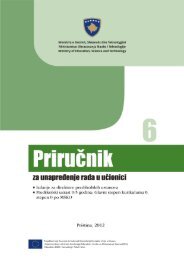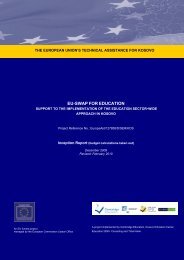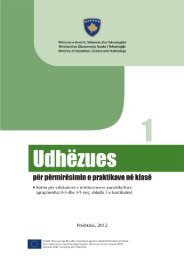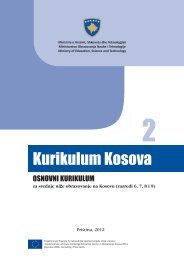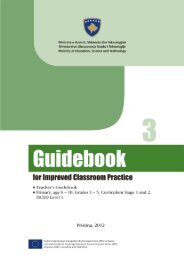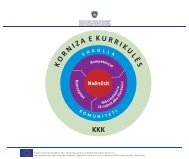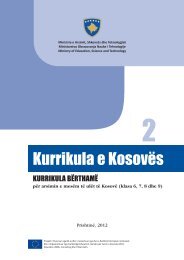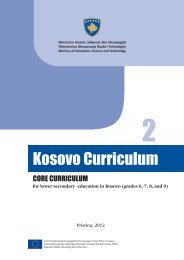English - EU EDUCATION SWAp Project
English - EU EDUCATION SWAp Project
English - EU EDUCATION SWAp Project
Create successful ePaper yourself
Turn your PDF publications into a flip-book with our unique Google optimized e-Paper software.
IC U L U M F R A M E WSCH O OLR ROC UCompetencesR KConceptsStudentsKCFAn <strong>EU</strong> funded project managed by the European Union Office in Kosovoand implemented by Cambridge Education, Kosova Education Center, Education 2000+ Consulting and Tribal Helm
Early Learning and Development Standards 0-6 yearsWhat are we tryingto do for allchildren?What do wewant for allchildrenSupportingdocumentGroupsTo be safeUN convention onchildren’s rightsDeaf and hardof hearingchildrenRAEandothersTo be takencare ofKosovo legislationon human rightsBlindandvisuallyimpairedchildrenRuralchildrenTo be exposedto learningexperiencesKCFAbusedor in carechildrenTo beengagedas newcitizensLanguagesofminoritiesTo be healthy Support for them and To take care of things that aretheir parents/caretakers important for childrenStandards For Development andLearning0-6 YearsSingle parenthomesChildren withphysicaldisabilitiesPoorchildrenUrbanchildrenKCCOrphanchildrenSNEPreschool EARLYLEARNING ANDDEVELOPMENT0-6 YEARSPrinciplesIndividuality Autonomy Self-esteem, Whole childpositive developmentconcept of selfValues Equality Development ofthe overallpersonality of childDevelopmentareasStandardsPhysical healthand locomotivedevelopmentLanguage andcommunicationdevelopmentCooperation amongeducational factorsEmotional andsocial developmentDevelopment ofcommunication skillsInteractive playing andlearningCreativityRespect andpatriotismEvery child is ready tolearn from their birthCognitive development andgeneral knowledgeStandards have been prepared for all development areas and subareasSocial responsibilityChild as an activeparticipatorDeveloping the approach tolearningInstitutionsPreschool Home Pre-primary Community basedcentresDaily care centresResults at the end ofpre universityeducationStudent competencesEffectivecommunicatorCreativethinkerSuccessful learnerProductivecontributorHealthyindividualResponsiblecitizenAn <strong>EU</strong> funded project managed by the European Union Office in Kosovoand implemented by Cambridge Education, Kosova Education Center, Education 2000+ Consulting and Tribal Helm
Curriculum framework for pre-university education in KosovoAIMSCOMPETENCESPRINCIPLESThe purpose ofpre-universityeducationStudents’competencesCurriculumprinciplesDevelopment ofpersonal and nationalidentity, statehoodand culturalbelongingEffectivecommunicatorInclusionPromotion ofgeneral cultural andcivic valuesDevelopment ofresponsibility for self,for others, for societyand for the environmentPreparation for life andwork in different socialand cultural contextsDevelopment ofentrepreneurship anduse of technologicalskillsCreative thinker Successful learner Productive contributor HealthyindividualDevelopment ofcompetencesCoherent and integratedteaching and learningSchool level autonomyand flexibilityPreparation for lifelonglearningResponsiblecitizenResponsibility and accountabilityIMPLEMENTATIONIN SCHOOLCurriculum AreasTeaching andLearningCross curricularissuesLanguages andcommunicationDifferentapproaches inclassroomPeace andtoleranceArts Mathematics NaturalsciencesBased onpracticalknowledgeHealth andsexualeducationInclusiveclassroomsEqualityLinks betweentheory and practiceEconomicawarenessDistancelearningSociety andenvironmentActiveparticipationPreparation forlife and workHealth andwellbeingStudentcentredEducation forentrepreneurshipLife and workUsing new technologiesCommunication skills incurriculum areasASSESSMENTAssessingachievementMeasures foraccountabilityAssessmenttools andproceduresIntegrated inteaching andlearningTogetherwithstudentsInternal assessmentUses datafromdifferentsourcesDaily aswell as at theend of atopic/unitAssessment atclassroom levelPromotes wideand balancedcurriculumIs understoodby studentsHelpsstudents’progressProvidesfeedbackHelps to identifyareas forinterventionAssessment at school level External assessment Matura examProvides peerassessment and selfassessmentAchievement Behaviour Civic participation Health and well being Employability Involvementin furthereducationAn <strong>EU</strong> funded project managed by the European Union Office in Kosovoand implemented by Cambridge Education, Kosova Education Center, Education 2000+ Consulting and Tribal Helm
LESSON PLANNING BASED ON KCF1What are we trying to achieve?R RC UIC U L U M F R A M E WSCH O OLComp etencesOR K2How to organize learning?KCF AimsKompetencat KCF Competences-së e KKK Fushat Curriculum e Kurrikul Areas ës and dhe subjectsL ëndëtStudentsInclusionDevelop and implement the lesson plan based on competences and learning outcomesActive andparticipatory learningDifferent teachingapproachesCorrelation withother Curriculum AreasUsing newtechnologiesLearningoutsideclassroomLinks withoptional curriculumC o nc ept s• Teaching must reflect the aims of KCFSUBJECT – Find the way through which your subjectcan contribute to learning. Select key conceptsprocesses and appropriate content.• Teaching ensures the achievement oflearning competences• Teaching different subjects must ensure theinclusion of cross-cutting issuesKCFCompetences – Plan their development througha range of experiences and contexts relatedto your subject. Encourage your students todevelop and express competencesfor a wide range of contextsTime – Plan the time creatively and beflexible when developing the lessonplan (day, week, month, year).Place – plan and use effectively the spacein classroom, school and environmentLessonplanningPeople – think about people that you cancooperate with to carry out certain teachingactivities (e.g. people from local communityorganizations, museums, art galleries, libraries,NGOs, etc)Other dimensions – are you using thecross-cutting issues and comparing themto the competences?Assessment – make it an integrated partof teaching and learning process throughdaily interaction with students and planfurther stepsSources – think about how you managethe required sources for your subject inorder to provide easy access for students(textbooks, internet, new technology, etc)3How can we successfully achieveour goals?Review the progress – plan the pointsfor reflection and assess students'progress towards achieving previouslyset goals.Assess and record the impact – assess andcontinuously record students' progress towardsachieving the competencesReflect and move on – after you have understood theimpact on students decide whether you want tocontinue what you are doing, you want to changeyour approach or continue with other priorities.To ensure transparency and accountability consideringAchievements,standards andnecessaryimprovementsBehaviour andattendanceActiveparticipationChoosing ahealthy lifestyleFurtherinvolvement ineducation,employment andtrainingAn <strong>EU</strong> funded project managed by the European Union Office in Kosovoand implemented by Cambridge Education, Kosova Education Center, Education 2000+ Consulting and Tribal Helm
Responsible CitizenCreative ThinkerEffectiveCommunicatorSuccessful Learner Healthy Individual Productive Contributor↓ ↓ ↓ ↓ ↓ ↓STUDENT ASSESSMENT SYSTEMCurriculum Framework Core Curriculum for education levels 1-3 Subject SyllabiFormative Assessment(at classroom level)What do students want to learn?Student-centeredAssessmentfor learning Planning forand of assessmentlearningAssessments involves reliablejudgments about student’sprogress and teachingpracticesIntegratedwithteaching andlearningStudentinvolvement inassessmentHOW DOES THE ASSESSMENT PROCESS FUNCTION?Assessment Scale – Numerical (1 - 5) and with Letters (A, B, C, D)Summative AssessmentFinal Assessment(at the end of a grade)(at the end of a Key Stage)What opportunities or learningexperiences do they need?Assessment based onlearning outcomeGuidelines designed tosupport assessmentWHAT DOES THIS MEAN FOR TEACHERS?Utilizing awide range offactsUtilizingdifferentassessmentstrategiesProvidingfeedback; peerassessment andself-assessmentOngoingassessment –daily, periodicallyStudents and parentsunderstand how progress isachievedAccurate,transparent,acceptable andreliable forstudentsExternal Assessment(annual, at the end of a level)What is to be achieved?Evidence provided for students’success and achievementProvides support inidentifying targetedprogression↑ ↑ ↑ ↑ ↑ ↑Responsible CitizenCreative ThinkerEffectiveCommunicatorProvides support tostudents to make theirchoice of educationand careerSuccessful Learner Healthy Individual Productive ContributorAn <strong>EU</strong> funded project managed by the European Union Office in Kosovoand implemented by Cambridge Education, Kosova Education Center, Education 2000+ Consulting and Tribal Helm



